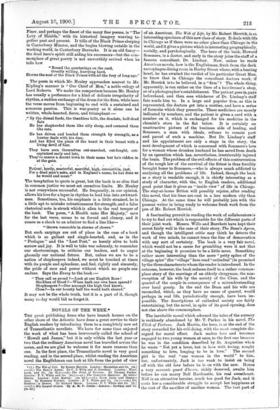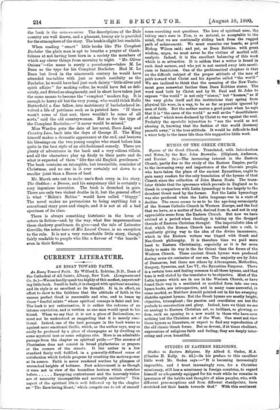NOVELS OF THE WEEK.*
THE great publishing firms who have branch houses on the other shore of the. Atlantic have done a great service to their English readers by introducing them to a completely new set of Transatlantic novelists. We have for some time enjoyed the .work of what has been irreverently called the school of " Howell and James," but it is only within the last year or two that the ordinary American novel has travelled across the ocean, and we are glad to welcome it for more reasons than one. In the first place, the Transatlantic novel is very good reading, and in the second place, whilst reading the American novel the Reglishman can look at life from the point of view • (1.) The Web of Life. By Robert Herrick. London : Macmillan and Co. (6s.) —(2.) The Dean's Apron. By C. Wills and G. Burchett. London : Ward, Lock, and Co. [38. 6d.1—(3.1 The Pita of Fortune. By Thomas Parkes. London : F. V. White and Co. [Gs.]—(4.) The Compteat Bachelor. By Oliver Onions. London : aohn Murray. (2s. 6d.)—(5.) Town Lady and Country Lass. By Florence Warden. London : F. V. White and Co. [es.]—(6.) The Goddess: a Demon. By Richard Marsh. London : F. V. White and Co. [es.] Hit -ha tsrei-Grotem -By -A.- R- Cooke. --London:-.Downey . Co.
(Be. 6d.] -
of an American. The Web of Life, by Mr. Robert Herrick, is an interesting specimen of this new class of story. It deals with life in Chicago as if there were no other-place-than Chicago in the world, and it gives a picture which is interesting geographically, socially, and psychologically. The hero of the book,-.Howard Sommers, is a doctor, and early in the story joins the staff of a famous consultant, Dr. Lindsay. Now, unless he reads American novels, how is the Englishman, fresh from the dark sarcophagus dining room in Harley Street where, with a beating heart, he has awaited the verdict of his particular Great Man, to know that in Chicago the consultant doctors work; if Mr. Herrick is to be believed, in a "firm" P The whole thing, apparently, is run rather on the lines of a hairdresser's shop, or of a photographer's establishment. The patient goes in, pays beforehand, and then sees whichever of Dr. Lindsay's staff fate sends him to. In a large and popular firm, as this is represented, the doctors get into a routine, and have a series of formulas which they prescribe. These medicines are merely indicated by numbers, and the patient is given a card with a number on it, which is exchanged for his medicine in the chemist's store in the flat below. It is certainly an unattractive picture of the business side of healing, and Sommers, a man with ideals, refuses to remain part and parcel of such a machine. But Dr. Lindsay's staff and his appointment are only a stage in the story, the next development of which is concerned with Sommers's love for a woman whose drunken husband he has saved from death by an operation which has, nevertheless, irretrievably injured the brain. The problem of the evil effects of this contravention of the rough law of the survival of the fittest is thus forcibly brought home to Sommers,—who is always much addicted to analysing all the problems of life. Indeed, though the book as a story is readable enough, it is chiefly interesting as a study of character, with the, to English readers, additional good point that it gives an " inside view" of life. in Chicago. The stay-at-home Briton will possibly rejoice, after. reading this novel, that his lines are cast in a lees modern city than Chicago. At the same time he will probahly join with the present writer in being ready to welcome fresh work from the pen of Mr. Robert Herrick..
A A fascinating pursuit in reading the work of collaborators is to try to find out which is responsible for the different parts of their joint work. Messrs. Wills and Burchett have kept their secret fairly well in the case of their story, The Dean's Apron, and though the intelligent critic may think he detects the work of two minds, he cannot trace the line of demarcation with any sort of certainty. The book, is a very fair novel, which would not be a cause for grumbling were it not that at the beginning it promises to be a little more. Something rather more interesting than the mere " petty spites of the village spire" (for "village" here read "cathedral") is promised by the three characters to whom the reader is introduced. In the outcome, however, the book.reduces itself to a rather common- place story of the marriage of an elderly clergyman, the non- reception of his wife by the society of the Close, and .the quarrel of the couple in consequence of a misunderstanding over local gossip. In the end the Dean and his wife are reconciled, which, as they have no cause of quarrel, would perhaps in real life, paradoxically enough, have been im- possible. The descriptions of cathedral society are fairly entertaining, but the novel, in spite of its good opening, does not rise above the commonplace.
The inevitable moral which adorned the tales of the nursery is recklessly abandoned by Mr. T. Parkes in his novel, The Flick of Fortune. Jack Martin, the hero, is at the end of the story rewarded for his evil-doing, with the most complete dis- regard for moral effect. Jack makes love and becomes engaged to two young women at once, to the first one because he was in the condition described by St Augustine when he wrote " Not yet a lover, but in love with loving, sought something to love, longing to be in love." The second girl is the real "one woman in the world" to Wm. but, unfortunately, Jack is too weak to insist on being off with the old love before be is on with the new. Hence a very mauvais quart d'heure, richly deserved, awaits him before he can marry Nell Hardcastle, his real . sweetheart. Nell is an attractive heroine, much too good for Jack; and it costs her a considerable struggle to accept her happiness at the cost of flee sacrifice of another woman. The best part of. the book is the mise-en-scene. The descriptions of the Dale country are well drawn, and a pleasant, breezy air is provided for the atmosphere of the story. The bookis slight but readable.
When reading " smart" little books like The Compleat Bachelor the plain man is apt to breathe a prayer of thank- fulness at not having been born in a society the members of which say clever things from morning to night. " Mr. Oliver Onions "—the name is surely a pseudonym—takes M. Le Beau as the type for his Compleat Bachelor. Had M. Le Beau but lived in the nineteenth century he would have attended tea-tables with just as much assiduity as the Bachelor, he would have had just such dainty " little silver and spirit affairs" for making coffee, he would have fed as deli- cately, and flirted as oleaginously, and in short have taken just the same means to become the " compleat modern fop. It is enough to hurry all but the very young, who would think Rollo Butterfield a fine fellow, into matrimony if bachelorhood in- volved a life of pettiness such as is painted here. " If there wasn't some of that sort, there wouldn't be some of all sorts," said the old countrywoman. But as for the type of the Compleat Bachelor,—" it never would be missed."
Miss Warden puts the date of her novel, Town Lady and Country Lass, back into the days of George II. The King himself makes a dramatic appearance at the end, and bestows his blessings on the two young couples who stand before him quite in the best style of an old-fashioned comedy. There are plenty of adventures in the book and a very odious villain, and all the characters play up finely to their parts and do what is expected of them " like fine old English gentlemen." The book contains an intangible, but irresistible, reminder of Christmas, and no one in it ever certainly sat down to a smaller joint than a Baron of beef.
Mr. Marsh sets out to make one's flesh creep in his story, The Goddess : a Demon, and his sanguinary idol is certainly a very ingenious invention. The book is drenched in gore. There are only two violent deaths in it, but the general effect is what " Helen's Babies " would have called " blugg,y." The novel makes no pretensions to being anything but a sensational story pure and simple, and it is not at all a bad specimen of its class.
There is always something histrionic in the loves of actors in fiction—and, by the way, what fine impersonations these shadowy gentlemen do give—and the tale of Leicester Greville, the actor-hero of His Laurel Crown., is no exception to the rule. It is not a very remarkable little story, though fairly readable to people who like a flavour of "the boards " even in their fiction.



































 Previous page
Previous page